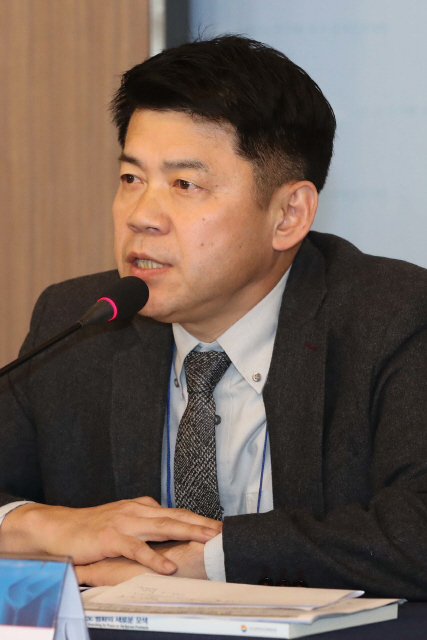Posted on : Sep.3,2019 17:21 KST
 |
|
Kim Joon-hyung, director of the Korea National Diplomatic Academy, speaks during the Hankyoreh Busan Forum in November 2018. (Park Jong-shik, staff photographer)
|
Says end of GSOMIA is “establishing boundaries in trilateral military cooperation
 |
|
Kim Joon-hyung, director of the Korea National Diplomatic Academy, speaks during the Hankyoreh Busan Forum in November 2018. (Park Jong-shik, staff photographer)
|
Kim Joon-hyung, the newly appointed director of the Korea National Diplomatic Academy, said there was “no need to jump to conclusions about the South Korea-US alliance being in jeopardy” following Seoul’s decision to end its General Security of Military Information Agreement (GSOMIA) with Tokyo.
Kim also said the measure had established boundaries in a sense, sending the message that trilateral military cooperation with the US cannot be allowed to develop into a military alliance that constrains the three sides’ activities.
“US strategists have interpreted GSOMIA as establishing key infrastructure for proceeding toward a South Korea-Japan acquisition and cross-servicing agreement (ACSA), a Northeast Asian missile defense system, and joint military exercises,” Kim said in a Sept. 2 meeting with reporters at the Ministry of Foreign Affairs complex in Seoul.
“While it was opposed to GSOMIA, the Moon Jae-in administration had continued to extend it because it had not yet proceeded in that direction. In some sense, Japan’s removal [of South Korea] from its white list offered a rationale for ending GSOMIA,” he explained.
He went on to say, “While this is just my personal opinion, I see the end of GSOMIA as establishing boundaries in trilateral military cooperation.”
“Certainly we can have cooperation in response to the threats posed by China or North Korea, but this is a touchstone sending the message that we can’t have a military alliance that ties the hands of South Korea, the US, and Japan,” he said.
Kim went on to say it was “reasonable and natural for the US to be upset about the end of GSOMIA or to express disappointment or dissatisfaction.”
“There’s no need to jump to conclusions about the South Korea-US alliance being ‘in jeopardy’ because of that. The alliance cannot come ahead of the national interest, and I think [the decision to end GSOMIA] represents the reasonable approach of a sovereign state,” he added.
Commenting on the rapidly changing global security environment, Kim said, “Because the fundamental framework is shifting, I think that even the major powers like the US and China are feeling anxious about the future security environment, albeit to differing degrees.”
“I don’t think there’s any difference among the individual countries in terms of effects to maximally reflect their own interests in the reorganization of that framework,” he continued.
Kim also discussed the announcement by the Blue House National Security (NSC) on Aug. 30 of plans to pursue the early return of 26 US Forces Korea bases.
“I think this could be a factor in future defense cost sharing negotiations with the US,” he predicted.
Unreasonable nature of US defense cost demands
“There wouldn’t be any need to do it if the US were being reasonable in its demands of us in defense cost sharing negotiations, but if we’re talking about fundamental changes to the structure – things like the US$5 billion that some in the US are demanding, or South Korea paying around 1.03 trillion [US$847.07 million] of the current 2 trillion won [US$1.65 billion] – then I think that [early base return issue] is something that needs to be sufficiently explored,” he said.
Kim acknowledged the current impasse in North Korea-US talks – with North Korean Vice Foreign Minister Choe Son-hui recently releasing a statement claiming that Pyongyang’s “expectations of dialogue with the US are gradually disappearing – but said he believes dialogue will eventually resume.
“North Korea thinks the US’ calculations still haven’t changed even after Kim Jong-un’s meeting with [US President Donald] Trump at Panmunjom on June 30, and they want to use pressure to get the US to change its approach, as we’ve seen with the weapon test launches and Choe Son-hui’s statement,” he said.
At the same time, he argued that Pyongyang “strongly desires a summit [with the US], and while it may not be this year, I suspect they will be meeting again.”
By Park Min-hee, staff reporter
Please direct comments or questions to [english@hani.co.kr]
Caption: Kim Joon-hyung, director of the Korea National Diplomatic Academy, speaks during the Hankyoreh Busan Forum in November 2018. (Park Jong-shik, staff photographer)










